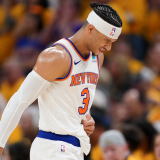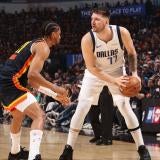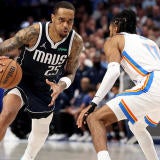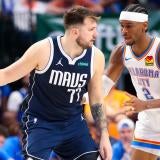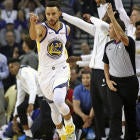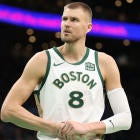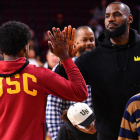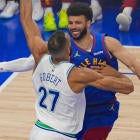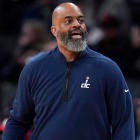OAKLAND, Calif. -- Steve Kerr owns eight diamond-studded rings that commemorate his eight NBA championships. Five of those rings come from his playing career -- 1996, 1997 and 1998 with the Chicago Bulls, then 1999 and 2003 with the San Antonio Spurs -- while three of them come his coaching career, which, amazingly, began only four years ago, when he was hired to become the coach of the Golden State Warriors.
He has never worn any of those rings other than on the night that he's received them. He's never known of any of his teammates or players to wear them, either. The rings stay in their boxes at home. One reason is practical: They are way, way too big to actually wear. But the second reason, and maybe the more important reason, is that the rings feel like too much of an individual thing. It's the banners -- the ones that hang high up in Oracle Arena, a testament to an accomplishment of a team and a culture and an entire organization -- that matter most.
"When the banner goes up," Kerr said Tuesday, a couple of hours before the ceremony began, "that's when it hits home and you share it with the fans and you hear the vibe in the building."
On Tuesday night -- "Ring Night," which Kevin Durant has called "a great distraction" that "tends to throw you off a bit," and that Steph Curry has called "the weirdest night of the year" -- NBA commissioner Adam Silver was on hand to help hand out the hardware. Kerr called them "amazing and gaudy and ridiculous in many ways, but in a great way." He put his newest ring on -- reversible, with 74 diamonds to represent every win -- and made a face as if the ring weighed 50 pounds. The players' rings descended on glowing metal ropes from the arena ceiling. Klay Thompson, sporting his fresh new beard, took his ring and placed it on his pinkie finger. Curry took the microphone and yelled, "Let's celebrate this to the fullest!" The arena counted down, and in the corner of the arena closest to the Warriors' bench, the Warriors' third championship banner of the past four years was unfurled.
It was 7:41 p.m. on the West Coast. The crowd went wild, and then, less than a minute later, the house lights came up. Curry curled up on the ground and pretended to snuggle with his ring. As players were dancing and posing for the cameras, the Oklahoma City Thunder walked out of the tunnel and started their warm-ups. Fifteen minutes and 10 seconds after the banner fell, at 7:56 p.m., Damian Jones, the Warriors' young starting center, lined up against the Thunder's Steven Adams at center court, where minutes ago the Larry O'Brien Trophy had been sitting on a table. The ball was tossed in the air, and thus began the Warriors' 2018-19 season, and another chapter in one of the NBA's greatest dynasties.
Here's the thing about dynasties: They can start when you're not really paying attention -- how many people saw the 2013-14 Warriors as the seed that would quickly grow into one of the greatest NBA dynasties of all time? -- and they can peter out before you even notice a decline has begun.
When in 2010 Joe Lacob purchased the Warriors, a franchise that had had only eight winning seasons since 1979, he made a bold statement at his introductory press conference. "If, at the end of the day, there isn't another banner hanging up there, then we've failed," Lacob said that day.
"Everyone laughed," Kerr recalled Tuesday. "I laughed. I was at home: 'Come on, the Warriors?' Joe set the goal that night. I think there was a young guy named Steph Curry in the building, who this whole thing has revolved around in many ways as it has crystallized."
The Warriors didn't seem to have lost their championship shine after rings were handed out and the banner unfurled on Tuesday. Sure, there was plenty of rust -- a turnover by Klay Thompson a few seconds into the game, one of 13 first-half turnovers for the Warriors, and the Warriors getting blitzed at the beginning of the third quarter by a Thunder team that finally remembered how to make shots, and a team that generally looked to Kerr like its conditioning was not yet up to speed. It wasn't the beautiful basketball that the Warriors have become known for. As Kevin Durant said afterward, it was tough, East Coast, grind-it-out basketball: "You're going to have to appreciate those games from us."
But, mostly, the Warriors looked like who we expected them to be: The best team in the NBA. Their first basket was a corner three by Curry, their second a driving layup in traffic by Durant, two of the best who have ever done it. Kerr had told me earlier in the day that his biggest concern was his team's defense, specifically at the center position, where the Warriors trotted out three young centers Tuesday -- starter Damian Jones, plus Kevon Looney and Jordan Bell -- but the youngsters all looked fine. Jones, who Kerr said will continue as the team's starting center for the time being, had 12 points and three blocks in 27 minutes. Looney, who Kerr said had the best training camp of the three youngsters, had 10 points, 10 rebounds and two blocks in 18 minutes. Anyway, whenever Boogie Cousins returns from his torn Achilles tendon, the Warriors will add one more All-Star, and this All-Star plays center, so any problems at center are temporary.
We speak about the Warriors with a feeling of inevitability, that the 2018-19 season will end -- will end, full stop -- with one more Warriors championship banner being unfurled by the Bay. But nothing is guaranteed. On Tuesday morning at the Warriors' practice facility when I sat down with Kerr, I asked him about how he keeps that feeling of inevitability from bleeding into his locker room.
He shrugged.
"We're used to it," he said. "I think back to 2015, our first year, when we won the championship. It was so new. But since then, we've been through everything, we've seen it all. We lost at home in a Game 7 of the Finals. We won a couple of titles. Throughout the year, there's always this stuff. You just learn to tune it out. There's going to be adversity. We're going to lose two or three games in a row, and everybody's going to say, 'Oh my God, the Warriors are in huge trouble.' You just move on. Because you know it's all just noise."
There will be plenty of noise surrounding these Warriors this season, but all that noise can be boiled down to this single question: How long can this dynasty last? Will this be the final year of this core group staying together as Klay Thompson and Kevin Durant weigh what their 2019 free agency will look like? Or, can it last two, three, four years longer, surpassing Michael Jordan's (and Steve Kerr's) Chicago Bulls as the greatest NBA dynasty of the modern NBA? Or will the decline begin this season, earlier than any of us would imagine, as the Warriors age and as other teams -- the Houston Rockets or Utah Jazz in the West, perhaps, the Boston Celtics or Toronto Raptors in the East -- continue to rise?
Kerr sees his role as this: To not think too much about the past, and to not think too far into the future. On Tuesday night, the Warriors got their rings, then they won a basketball game. The page flipped from last season to this season. Kerr didn't want to look any further past that.
"What we're trying to do is remind our guys how lucky we are to be in this position," Kerr told me. "We want to enjoy it for as long as it lasts. Maybe it lasts a few more seasons. Who knows? Maybe it doesn't. You don't know what's coming in the NBA."
"Or," he added, "in life."







